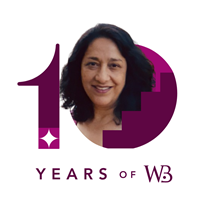
Tazeem Abbas
Tazeem is a board member at SW9 Community Housing and School Governor at Caldew School, Carlisle. She is a qualified accountant with broad executive experience in regeneration and the tourism industry. Tazeem joined us for our special 10th birthday 10 for 10 podcast series, when we’re interviewing ten of our members to share their advice and insight into building a successful board career.
2022
You can listen to Tazeem’s story in full on podcast here or search ‘Women on Boards Success Stories’ in all major apps:
Finding new challenges through the boardroom
Tazeem’s board career started at a young age, when she first moved to London. Her intention at the time was not to be on a board as such, but to campaign on causes she felt strongly about. This led her to working on the London Committee for the Anti- Apartheid movement, and later on boards of other anti-racist groups.
When she moved again – this time to Carlisle with a family business in tourism – Tazeem joined a board in her new community. Tourism was a new industry for Tazeem, so she engaged with Cumbria Tourism. Putting herself forward for the Commercial Members Committee proved a fantastic way to connect with other professionals and get a strategic view of the industry.
A new challenge
It was through this board that Tazeem began to get more serious about a building a board career. “I was a bit bored,” she says, “I wanted a challenge and there wasn’t much prospect for exerting strategic influence in my day-to-day. Non-executive roles seemed an exciting way to engage.”
A fellow board member recommended Women on Boards. Tazeem joined and made an early application for a role she was well-qualified for. “I found Women on Boards pre-interview call incredibly supportive,” she remembers, “I still remember talking to Alison, pulled over in a lay-by, as it was all quite short notice.”
“However, I fluffed that interview really badly! What I learnt was that I did have a habit of putting myself down and not highlight my achievements fully.”
Dealing with rejection
Having reflected on this, Tazeem redoubled her engagement with Women on Boards attending many of the groups and events, including one of the Peer Support Groups. “Spending time in Women on Boards groups and meetings was so valuable as I began to feel more comfortable and confident in that non-executive space,” she comments.
When Women on Boards’ Bespoke Search team highlighted an opportunity at SW9 housing management company, Tazeem was keen to apply. “I had actually lived in that postcode in London, and so felt that connection. I also had significant experience in housing and regeneration, and in stock transfer in particular.” Tazeem didn’t let the fact she was still living in Carlisle be a barrier – and was successfully appointed as a board member.
Developing as a Non-Exec.
Tazeem has also been a long-standing governor at a local school. “It has a very rural catchment area, through the Fells, but has a lot of the deprivation issues more usually associated with inner city areas,“ she explains. “I bring a slightly different side of my skill set here. Although I am very strategic, as an accountant I have a good eye for detail and compliance which I’ve been able to apply to the various regulatory codes the school is subject to.”
Tazeem found this board in particular has pushed her development as a non-executive. “Though everyone knows a bit about education, as we’ve all been to school, actually running a school is very complicated. Not being an education professional myself, I found the governor role is more about holding the executive to account, rather than advising directly on how to do their job,“ Tazeem reflects. “I learnt a lot about stepping back and also about being brave enough to ask the challenging questions, which is especially hard when the executive is operating under difficult circumstances.”
Bringing about change
The style in which you do this really matters, which is something Tazeem has brought considerable thought and skill to. She explains, “It’s about talking through issues over time, to influence a shift. It’s about all relationships, which allow you to negotiate and influence more effectively. Within a board, you need alliances and support to raise issues and bring about change.”
